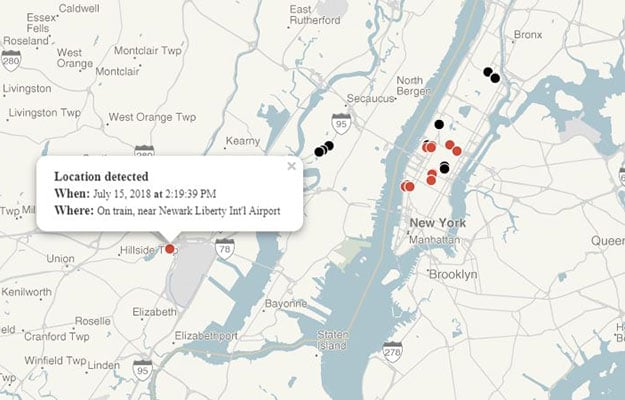Google Accused Of Tracking Your Location Data Even If You Opt Out
Does Google track your location? A study by the Associated Press and Princeton University discovered that some Google services store your location regardless of your privacy settings. It is believed that over 2 million Android users are affected by this issue.
Google claims that if users turn off their “Location History”, it will no longer store the places the users have been. The AP and Princeton University insist that some Google apps store time-stamped locations, even if the user has disabled “Location History”. Some of these exceptions make sense, but others seem illogical. On one hand, Google will look up your location to provide an accurate weather update. On the other, Google will also store your location for searches as random as “chocolate chip cookies.”
The AP and Princeton University argue that the main issue is that Google is not always upfront about their data policies. Users must go to their “Web and App Activity” settings to prevent Google from saving location markers. If a user only disables “Location History”, this will merely prevent Google from saving your location to your Timeline. Unfortunately the “Web and App Activity” settings tab does not explicitly state that it is related to location.

Users are able to delete the saved location markers at myactivity.google.com, but this can be a tedious process. The user must delete each maker one-by-one. It is also unclear where all of the markers are stored, because some of them can be found under headers that are unrelated to location.
Why does Google doggedly track your location? A user’s location is often necessary for certain apps to work to their fullest extent. For example, Google Maps will use a person’s location to help them navigate to their destination or provide updates on traffic. Google also records a user’s location to target advertisements. Many advertisements are directed at a specific region or nearby stores.
This is not the first time Google has come under fire for tracking user’s locations without their permission. Business news site Quartz revealed last November that Google was tracking users’ locations through cell towers. Google quickly altered its policy after the discovery.
Google also recently received a letter from the United States House of Representatives with questions about its data policies. Congress is especially concerned about third-party access to consumer data and recording users without their permission. Google’s parent company Alphabet assured Congress that “Protecting our users’ privacy and securing their information is of the utmost importance to Google.”
Google claims that if users turn off their “Location History”, it will no longer store the places the users have been. The AP and Princeton University insist that some Google apps store time-stamped locations, even if the user has disabled “Location History”. Some of these exceptions make sense, but others seem illogical. On one hand, Google will look up your location to provide an accurate weather update. On the other, Google will also store your location for searches as random as “chocolate chip cookies.”
The AP and Princeton University argue that the main issue is that Google is not always upfront about their data policies. Users must go to their “Web and App Activity” settings to prevent Google from saving location markers. If a user only disables “Location History”, this will merely prevent Google from saving your location to your Timeline. Unfortunately the “Web and App Activity” settings tab does not explicitly state that it is related to location.
A map created by Princeton research Gunes Acar to demonstrate the locations Google tracked
Users are able to delete the saved location markers at myactivity.google.com, but this can be a tedious process. The user must delete each maker one-by-one. It is also unclear where all of the markers are stored, because some of them can be found under headers that are unrelated to location.
Why does Google doggedly track your location? A user’s location is often necessary for certain apps to work to their fullest extent. For example, Google Maps will use a person’s location to help them navigate to their destination or provide updates on traffic. Google also records a user’s location to target advertisements. Many advertisements are directed at a specific region or nearby stores.
This is not the first time Google has come under fire for tracking user’s locations without their permission. Business news site Quartz revealed last November that Google was tracking users’ locations through cell towers. Google quickly altered its policy after the discovery.
Google also recently received a letter from the United States House of Representatives with questions about its data policies. Congress is especially concerned about third-party access to consumer data and recording users without their permission. Google’s parent company Alphabet assured Congress that “Protecting our users’ privacy and securing their information is of the utmost importance to Google.”

